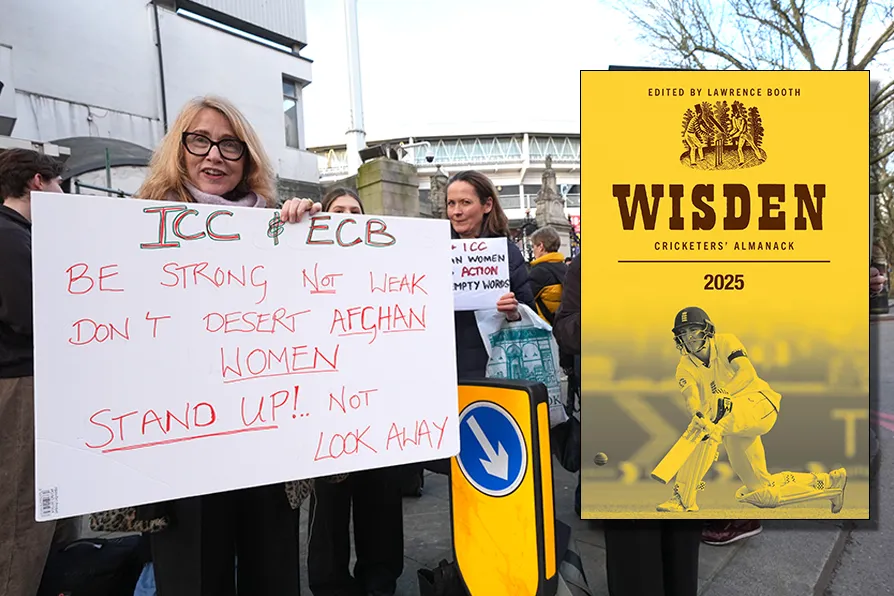STEPHANIE DENNISON and ALFREDO LUIZ DE OLIVEIRA SUPPIA explain the political context of The Secret Agent, a gripping thriller that reminds us why academic freedom needs protecting
PETER MASON is surprised by the bleak outlook foreseen for cricket’s future by the cricketers’ bible

 IT'S JUST NOT CRICKET: Protesters demonstrate outside Lord's Cricket Ground in London, on February 25 2025, against England playing Afghanistan in a Champions Trophy match, as female participation in sport has effectively been outlawed in Afghanistan sinc
IT'S JUST NOT CRICKET: Protesters demonstrate outside Lord's Cricket Ground in London, on February 25 2025, against England playing Afghanistan in a Champions Trophy match, as female participation in sport has effectively been outlawed in Afghanistan sinc
Wisden Cricketer’s Almanack 2025
Edited by Lawrence Booth
Wisden, £60
AS ITS editor Lawrence Booth notes in the preface to this year’s 162nd edition, Wisden – the cricketers’ bible – has always been “more inclined towards evolution rather than revolution.”
It’s a surprise, then, to find the newly published 2025 almanack presenting a decidedly radical face to the world – one that’s more critical of the cricketing establishment and its greedy, capitalist outlook than perhaps it has ever been.
At the heart of Wisden’s scathing disaffection is its belief that 2024 “was the year cricket gave up any claim to being properly administered,” a state of affairs it feels was encapsulated by the accession of the Indian businessman Jay Shah, a close associate of Narendra Modi, to the chairmanship of the International Cricket Council.
In a wide-ranging series of introductory remarks to the 1,584-page annual, Booth urges Shah to show fresh leadership by redistributing cricket’s wealth, better sustaining the poorer playing nations and putting a stop to the “endless triangle of mutual backscratching” indulged in by India, Australia and England.
He gives no signs, however, of believing that anything of the kind will happen, noting that “selfishness is now ingrained in the global game,” with administrative boards rendering cricket “ever more one-dimensional” through their pursuit of “the chimera of perpetual growth.”
The most glaring example of that approach is the Hundred competition in England, which recently generated close to £1bn through the sale of team shares to big business. Although theoretically some of that revenue will make its way to the counties, Wisden is clearly sceptical about the long-term outcomes, warning that “not all businessmen are philanthropists, whatever their honeymoon promises” and suggesting the whole enterprise could turn out to be a “Faustian pact.”
Bemoaning the fact that an increasing number of English county sides are no longer owned by their members, it says they have only themselves to blame for the demutualisation, as it’s been their innate “conservatism” that has contributed to the Hundred’s rise “and their own marginalisation.”
Overall, the 2025 almanack paints a bleak outlook of cricket’s future – not existentially, but in terms of its heart and soul. Though it puts forward few concrete solutions to what it clearly sees as a crisis, the overarching theme is that “it is in everyone’s interest to share the love” – which presumably means the game needs to be wrested from the hands of the one-eyed money men who have grabbed hold of it.
That such a traditional organ should find itself so dissatisfied with the status quo demonstrates what a dangerous moral state the game now finds itself in. If Wisden is no longer happy with evolution, then perhaps a revolution might be on the way.

PETER MASON is beguiled by a fascinating account of the importance of cricket to immigrants from the Caribbean to the UK

GUILLERMO THOMAS is persuaded by a scathing critique of the Church of England and its embeddedness in imperialism

JON GEMMELL presents his annual review of ’the bible of cricket,’ which provides insight into the sport, and its social, economic and political setting










